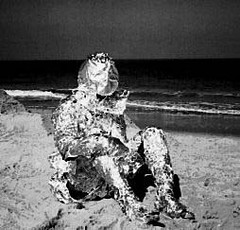Passing

I watched the motion picture The Human Stain last night after having rented it from Netflix, and was amazed at its power, though it is but a cameo of the Philip Roth novel. I’m not sure why it received so little attention. The cast is spectacular, Anthony Hopkins, Nicole Kidman, Ed Harris, Gary Sinise, Wentworth Miller, Mimi Kuzyk. Hopkins portrayal of the senior Coleman Silk is, as one would expect, superbly nuanced, while Miller’s interpretation of the young Coleman Silk is balanced, though a bit stiff. Nicole Kidman does her superior best as a raspy voiced Faunia Farley in which there is no trace left of crusty origins, only the detritus of a destroyed personality and life. Ed Harris is chilling in his understated portrayal of the psychotic Lester Farley. Gary Sinise’s and Mimi Duzyk’s characters are however written too thin to demonstrate the subtleties of Roth’s Nathan Zuckerman and Delphine Roux. I suppose part of the problem here is that cinema necessitates the dilution of the novel in order to zero in on the singular most important piece of plot that will carry the cinematic vehicle to an easily recognizable visual denouement.
The subject, passing has been done in the past, most noticeably in the novel Imitation of Life, (1933) by Fannie Hurst, and the two films based on it, Imitation of Life, (1934), directed by Fred Stahl, staring Claudette Colbert and Warren William and Imitation of Life (1959), directed by Douglass Sirk, staring Lana Turner, John Gavin, Sandra Dee, Susan Kohner, and Juanita Moore. The 1934 film deals more poignantly with the subject “passing,” than the 1959 Sirk version, which attempts to be a more thorough critique of 1950’s American society and culture. However, the subject of “passing” has not only to do with light skinned blacks posing as white, but also gay and lesbian men and women posing as heterosexual and the twenty-first century “down low” phenomenon of married black American males refusing to claim the bisexual and/or gay identity that their sexual behavior describes. Having spent many decades of my own life passing as heterosexual, I am an expert on the matter.
I have recently had several conversations with young Peter about passing, and I hope to continue writing more on the subject in my next few entries, dear Journal.
You can send E-mail comments to



1 Comments:
I'm not sure if I believe there is anyone that's truly "straight". I feel that everyone straight has a little bi in them whether they would actually admit it or not. I'm bi and African American. My father is a minister, so when I was young I stayed in the closet for that reason. But once I moved out...I came out. I can only imagine the number of people that are passing as or playing it straight. They have to be in constant turmoil over their true emotions. There's a negativity that a lot of people see when they hear "I'm gay" that it keeps people from coming out. And that's not even touching on the fact that just about everyone knows someone that can't stand gay people. I think that if society as a whole was more acceptable then a lot more people would feel comfortable coming out. I hope this has made since because I'm really tired right now...lol.
Post a Comment
<< Home